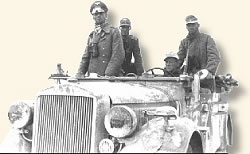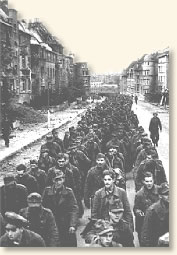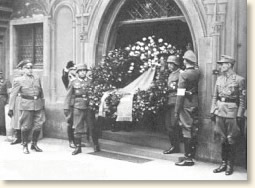|
The Forced Suicide of
Field Marshall Rommel, 1944
For a time, Erwin Rommel was Hitler's favorite general. Gaining prominence in 1940 as a commander of a panzer division that smashed the French defenses (see "Blitzkrieg, 1940"), Rommel went on to command the Afrika Korps where his tactical genius, ability to inspire his troops and make the best of limited resources, prompted Hitler to elevate him to the rank of Field Marshall. In 1943, Hitler placed Rommel in command of
 |
| Rommel in the African desert, 1941 |
fortifying the "Atlantic Wall" along the coast of France - defenses intended to repel the inevitable invasion of Europe by the Allies.
By the beginning of 1943, Rommel's faith in Germany's ability to win the war was crumbling, as was his estimation of Hitler. Touring Germany, Rommel was appalled at the devastation of the Allied bombing raids and the erosion of the peoples' morale. He also learned for the first time of the death camps, slave labor, the extermination of the Jews and the other atrocities of the Nazi regime. Rommel became convinced that victory for Germany was a lost cause and that prolonging the war would lead only to his homeland's devastation. He came in contact with members of a growing conspiracy dedicated to ousting Hitler and establishing a separate peace with the western allies.
On July 17, 1944, British aircraft strafed Rommel's staff car, severely wounding
the Field Marshall. He was taken to a hospital and then to his home in Germany
to convalesce. Three days later, an assassin's bomb nearly killed Hitler during
a strategy meeting at his headquarters in East Prussia. In the gory reprisals
that followed, some suspects implicated Rommel in the plot. Although he may
not have been aware of the attempt on Hitler's life, his "defeatist" attitude
was enough to warrant Hitler's wrath. The problem for Hitler was how to eliminate
Germany's most popular general without revealing to the German people that
he had ordered his death. The solution was to force Rommel to commit suicide
and announce that his death was due to his battle wounds.
Rommel's son, Manfred, was 15 years old and served as part of an antiaircraft crew near his home. On October 14th, 1944 Manfred was given leave to return to his home where his father continued to convalesce. The family was aware that Rommel was under suspicion and that his chief of staff and his commanding officer had both been executed. Manfred's account begins as he enters his home and finds his father at breakfast:
"...I arrived at Herrlingen at 7:00 a.m. My father was at breakfast. A cup was quickly brought for me and we breakfasted together, afterwards taking a stroll in the garden.
'At twelve o'clock to-day two Generals are coming to discuss my future employment,' my father started the conversation. 'So today will decide what is planned for me; whether a People's Court or a new command in the East.'
'Would you accept such a command,' I asked.
He took me by the arm, and replied: 'My dear boy, our enemy in the East is so terrible that every other consideration has to give way before it. If he succeeds in overrunning Europe, even only temporarily, it will be the end of everything which has made life appear worth living. Of course I would go.'
Shortly before twelve o'clock, my father went to his room on the first floor and changed from the brown civilian jacket which he usually wore over riding-breeches, to his Africa tunic, which was his favorite uniform on account of its open collar.
At about twelve o'clock a dark-green car with a Berlin number stopped in front of our garden gate. The only men in the house apart from my father, were Captain Aldinger [ Rommel's aide]
, a badly wounded war-veteran corporal and myself. Two
generals - Burgdorf, a powerful florid man, and Maisel, small and slender - alighted
from the car and entered the house. They were respectful and courteous and asked
my father's permission to speak to him alone. Aldinger and I left the room. 'So
they are not going to arrest him,' I thought with relief, as I went upstairs
to find myself a book.
"I shall be dead
in a quarter
of an hour"
|
A few minutes later I heard my father come upstairs and go into my mother's room. Anxious to know what was afoot, I got up and followed him. He was standing in the middle of the room, his face pale. 'Come outside with me,' he said in a tight voice. We went into my room. 'I have just had to tell your mother,' he began slowly, 'that I shall be dead in a quarter of an hour.' He was calm as he continued: 'To die by the hand of one's own people is hard. But the house is surrounded and Hitler is charging me with high treason. ' "In view of my services in Africa," ' he quoted sarcastically, 'I am to have the chance of dying by poison. The two generals have brought it with them. It's fatal in three seconds. If I accept, none of the usual steps will be taken against my family, that is against you. They will also leave my staff alone.'
'Do you believe it?' I interrupted. 'Yes,' he replied. 'I believe it. It is very much in their interest to see that the affair does not come out into the open. By the way, I have been charged to put you under a promise of the strictest silence. If a single word of this comes out, they will no longer feel themselves bound by the agreement.'
I tried again. 'Can't we defend ourselves…' He cut me off short. 'There's no point,' he said. 'It's better for one to die than for all of us to be killed in a shooting affray. Anyway, we've practically no ammunition.' We briefly took leave of each other. 'Call Aldinger, please,' he said.
Aldinger had meanwhile been engaged in conversation by the General's escort to keep him away from my father. At my call, he came running upstairs. He, too, was struck cold when he heard what was
 |
German prisoners are
marched through the
streets of Aachen - the
first German city to
fall. October 1944 |
happening. My father now spoke more quickly. He again said how useless it was to attempt to defend ourselves. 'It's all been prepared to the last detail. I'm to be given a state funeral. I have asked that it should take place in Ulm. [a town near Rommel's home] In a quarter of an hour, you, Aldinger, will receive a telephone call from the Wagnerschule reserve hospital in Ulm to say that I've had a brain seizure on the way to a conference.' He looked at his watch. 'I must go, they've only given me ten minutes.' He quickly took leave of us again. Then we went downstairs together.
We helped my father into his leather coat. Suddenly he pulled out his wallet. 'There's still 150 marks in there,' he said. 'Shall I take the money with me?'
'That doesn't matter now, Herr Field Marshal,' said Aldinger.
My father put his wallet carefully back in his pocket. As he went into the hall, his little dachshund which he had been given as a puppy a few months before in France, jumped up at him with a whine of joy. 'Shut the dog in the study, Manfred,' he said, and waited in the hall with Aldinger while I removed the excited dog and pushed it through the study door. Then we walked out of the house together. The two generals were standing at the garden gate. We walked slowly down the path, the crunch of the gravel sounding unusually loud.
As we approached the generals they raised their right hands in salute. 'Herr Field Marshal,' Burgdorf said shortly and stood aside for my father to pass through the gate. A knot of villagers stood outside the drive…
The car stood ready. The S.S. driver swung the door open and stood to attention. My father pushed his Marshal's baton under his left arm, and with his face calm, gave Aldinger and me his hand once more before getting in the car.
 |
Hitler's wreath is carried in Rommel's
funeral procession Oct. 18, 1944 |
The two generals climbed quickly into their seats and the doors were slammed. My father did not turn again as the car drove quickly off up the hill and disappeared round a bend in the road. When it had gone Aldinger and I turned and walked silently back into the house…
Twenty minutes later the telephone rang. Aldinger lifted the receiver and my father's death was duly reported.
It was not then entirely clear, what had happened to him after he left us. Later we learned that the car had halted a few hundred yards up the hill from our house in an open space at the edge of the wood. Gestapo men, who had appeared in force from Berlin that morning, were watching the area with instructions to shoot my father down and storm the house if he offered resistance. Maisel and the driver got out of the car, leaving my father and Burgdorf inside. When the driver was permitted to return ten minutes or so later, he saw my father sunk forward with his cap off and the marshal's baton fallen from his hand."
References:
Hart, B. H. Liddell, The Rommel Papers (1953); Manvell, Roger, Heinrich Fraenkel, The Men Who Tried to Kill Hitler (1964).
How To Cite This Article:
"The Forced Suicide of Field Marshall Rommel, 1944," EyeWitness to History, www.eyewitnesstohistory.com (2002).
|






